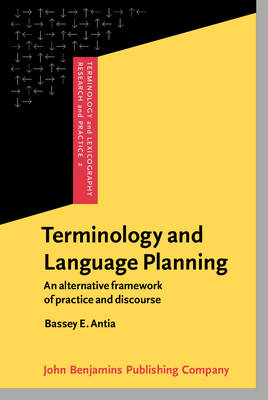
Terminology and Language Planning
An alternative framework of practice and discourse
Seiten
2000
John Benjamins Publishing Co (Verlag)
978-90-272-2325-8 (ISBN)
John Benjamins Publishing Co (Verlag)
978-90-272-2325-8 (ISBN)
Changing socio-political landscapes, the dynamics of "glocalization", among other factors, are spawning new policy attitudes towards multilingualism, and putting language planning on the map. With respect to terminology, this book suggests how LP can be relevant and sustainable.
Changing socio-political landscapes, the dynamics of ‘glocalisation’, among other factors, are spawning new policy attitudes towards multilingualism, and again putting language planning (LP) on the map – in a manner reminiscent of the 1960s and 1970s. With respect to terminology, this book suggests that to be relevant and sustainable, current LP would have to define its mission as the deregulation of access to specialised knowledge, and correspondingly be founded on substantially different methods and theoretical bases: epistemology and ontology of specialised domains; research on language for special purposes (LSP) and collocations; corpus linguistics; knowledge extraction and knowledge representation; language engineering technologies. On the one hand, the book recommends itself to decision-makers and language planning project managers. On the other, it should be of interest to students of LSP and terminology, language planning, concept and object theories, knowledge modelling, artificial intelligence, text and corpus management, translation process analysis, text and African linguistics.
Changing socio-political landscapes, the dynamics of ‘glocalisation’, among other factors, are spawning new policy attitudes towards multilingualism, and again putting language planning (LP) on the map – in a manner reminiscent of the 1960s and 1970s. With respect to terminology, this book suggests that to be relevant and sustainable, current LP would have to define its mission as the deregulation of access to specialised knowledge, and correspondingly be founded on substantially different methods and theoretical bases: epistemology and ontology of specialised domains; research on language for special purposes (LSP) and collocations; corpus linguistics; knowledge extraction and knowledge representation; language engineering technologies. On the one hand, the book recommends itself to decision-makers and language planning project managers. On the other, it should be of interest to students of LSP and terminology, language planning, concept and object theories, knowledge modelling, artificial intelligence, text and corpus management, translation process analysis, text and African linguistics.
1. Acknowledgments; 2. Introduction; 3. Globalisation, Language Planning and Terminology; 4. About this book: Specific motivations and contents; 5. 1. Terminology in Language Planning Theory; 6. 2. Terminology Discourse and Practice in Africa Issues, Players and Arenas; 7. 3. Evaluation of a Terminology Resource; 8. 4. Concept Theory in Terminology; 9. 5. Collocations and Communication; 10. 6. Terminography and Knowledge Representation; 11. 7. Terminology, Text and Technology; 12. 8. Applications: The Making of a Legislative Terminology Resource; 13. Conclusion; 14. Bibliography; 15. Subject Index; 16. Name Index
| Erscheint lt. Verlag | 15.8.2000 |
|---|---|
| Reihe/Serie | Terminology and Lexicography Research and Practice ; 2 |
| Verlagsort | Amsterdam |
| Sprache | englisch |
| Gewicht | 665 g |
| Themenwelt | Geisteswissenschaften ► Philosophie ► Sprachphilosophie |
| Geisteswissenschaften ► Sprach- / Literaturwissenschaft ► Sprachwissenschaft | |
| ISBN-10 | 90-272-2325-4 / 9027223254 |
| ISBN-13 | 978-90-272-2325-8 / 9789027223258 |
| Zustand | Neuware |
| Haben Sie eine Frage zum Produkt? |
Mehr entdecken
aus dem Bereich
aus dem Bereich
Macht und Legitimität politischer Sprache im Prozess der europäischen …
Buch | Softcover (2023)
Nomos (Verlag)
74,00 €
Wie die Menschheit zu ihrer größten Erfindung kam
Buch | Softcover (2022)
C.H.Beck (Verlag)
18,00 €


